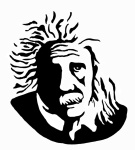From Creator to Genius
 What is a genius? Genius is harder to define than intelligence or creativity. One definition: a person with “exceptional intellectual or creative power or other natural ability.” (Oxford dictionary) But great intellectual or other ability defines potential, not achievement. So, we prefer a more general concept: “Some minds are so exceptional that they change the world… But monumental intelligence on its own is no guarantee of monumental achievement…The truest measure of a genius is whether a person’s work resonates through the ages.” (1)
What is a genius? Genius is harder to define than intelligence or creativity. One definition: a person with “exceptional intellectual or creative power or other natural ability.” (Oxford dictionary) But great intellectual or other ability defines potential, not achievement. So, we prefer a more general concept: “Some minds are so exceptional that they change the world… But monumental intelligence on its own is no guarantee of monumental achievement…The truest measure of a genius is whether a person’s work resonates through the ages.” (1)
“A person whose work resonates through the ages.” That’s a great description but doesn’t necessarily help decide who the geniuses are. It’s not as “simple” as an IQ test, and there isn’t always consensus on who were geniuses of the past and who are geniuses today. However, most lists include names such as Homer, Leonardo da Vinci, Michelangelo, Shakespeare, Mozart, Galileo, Newton, Darwin, Curie, and Einstein.
Genius is also harder to study than intelligence or creativity. Why? Because there are so few true geniuses. Additionally, because many of those recognized as geniuses lived in the distant past, it’s even harder to answer the question: “What is different in his or her brain that makes that person a genius?”
Another question that is difficult to answer: Are there different kinds of geniuses? In other words, are the inner workings of the brains of geniuses in science, technology, and math the same as ones in arts and literature?
Two things appear clear. A high IQ score doesn’t necessarily mean genius, but extreme creativity is a factor. And there are other connections that can be made. For example: “Many creative people are polymaths, as historic geniuses including Michelangelo and Leonardo da Vinci were.” And there is a connection between highly gifted people and mental illness: “Some people see things others cannot, and they are right, and we call them creative geniuses. Some people see things others cannot, and they are wrong, and we call them mentally ill. And some people, like John Nash, are both.” (2)
But all of this is general and raises the question as to whether a scientific study of genius is a hopeless dream? Not quite. New technology is starting to provide clues. As we described in a previous post, brain research involving advanced technologies has shown that creative brains are “wired differently.” The same has been shown in studies of Einstein’s brain. (3) Specifically, it was shown that there is “more connectedness and communication between different areas of Einstein’s brain” and “anatomic and cellular differences.” In simpler terms, “a distinguishing characteristic of Einstein’s brain was how the different lobes and the two hemispheres were more interconnected.”
So, new tools are providing a scientific basis for brain research. And once there is an in-depth, data-based understanding of brain function (including structure and networks) the possibilities are endless: from curing mental illness to increasing creativity to changing the essence of a person to…..
- Claudia Kalb, “What Makes a Genius? Some minds are so exceptional they change the world. We don’t know exactly why these people soar above the rest of us, but science offers us clues,” National Geographic, May 2017, https://www.nationalgeographic.com/magazine/2017/05/genius-genetics-intelligence-neuroscience-creativity-einstein/
- Nancy Andreasen, “Secrets of the Creative Brain: A leading neuroscientist who has spent decades studying creativity shares her research on where genius comes from, whether it is dependent on high IQ—and why it is so often accompanied by mental illness,” The Atlantic, July/August 2014, https://www.theatlantic.com/magazine/archive/2014/07/secrets-of-the-creative-brain/372299/
- Mark Hom, “Beyond Einstein’s Brain: The Anatomy of Genius,” Elsevier SciTech Connect, November 30, 2015, http://scitechconnect.elsevier.com/beyond-einsteins-brain-anatomy-genius/




